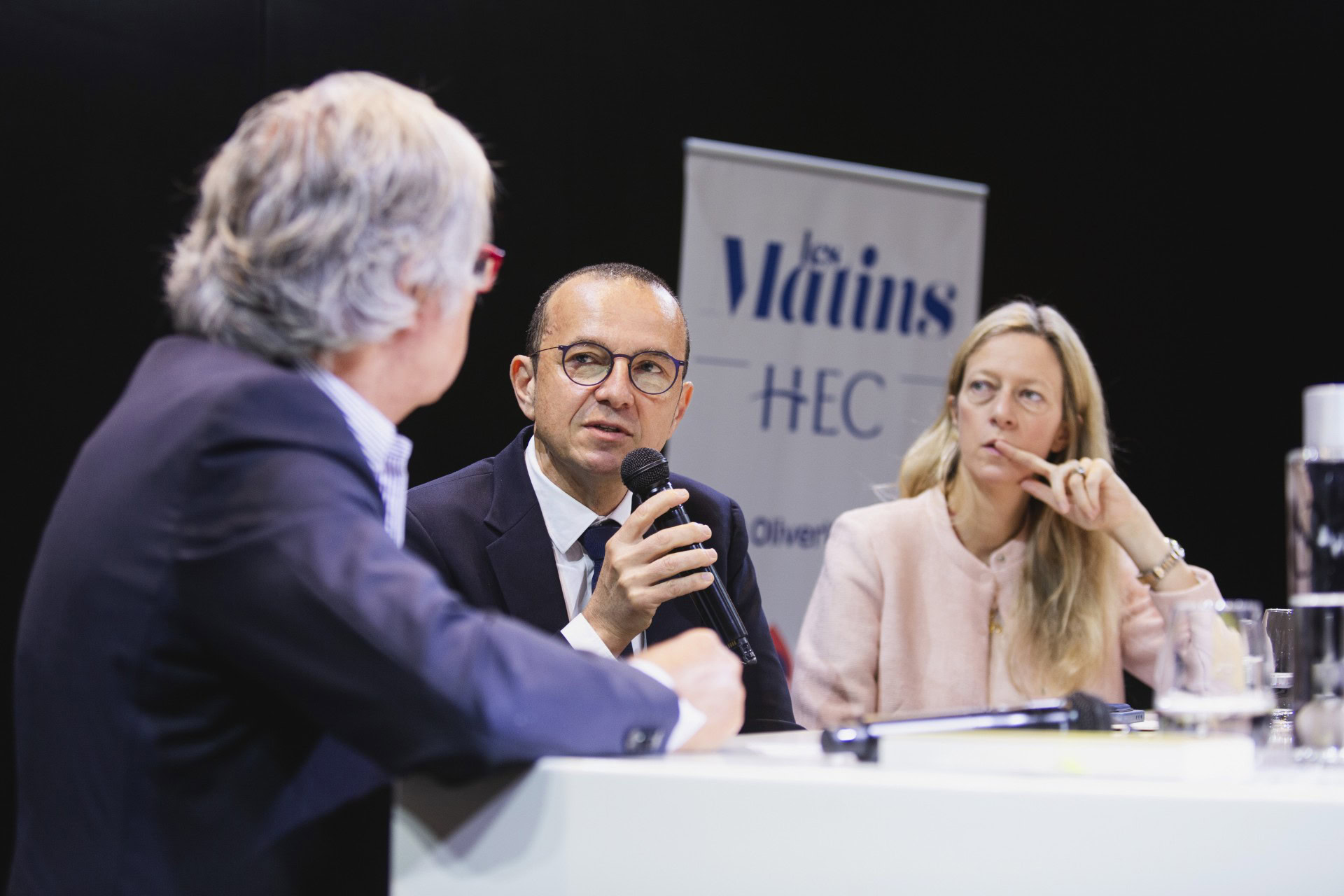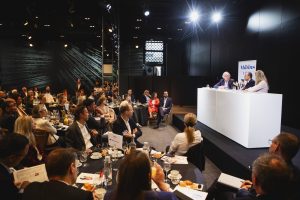Matin HEC with Olivier Blum, CEO of Schneider Electric

At the start of June, over breakfast, Les Matins HEC welcomed Olivier Blum, the new CEO of Schneider Electric. Nearly 150 alumni and members of the HEC community came to hear him speak. Innovation, energy transition, AI, and internationalization—the executive, with over 30 years at the company, tackled these topics with ease and candor. A look back at this insightful exchange.
Schneider Electric: The Joyful Globalization
Watching Schneider Electric steadily continue its international expansion, one might think it’s a smooth ride… “We made the choice twenty years ago to be an innovative company in all regions of the world—not just in Rueil or Boston,” explained Olivier Blum, the Group CEO since November 2024, during the Matins HEC conference. The room was packed to hear the fifty-something executive. Introduced by Hortense de Roux (H.05), President of HEC Alumni, Blum was described as having had a career “worthy of Tintin the reporter.” Indeed, the tireless father of three has worked in China, India, and Hong Kong before settling in Dubai. From his Middle Eastern office, he now leads the €38 billion revenue giant, whose executive committee includes seven different nationalities.
At the helm of a decarbonization leader, with 95% of its business conducted outside France, he advocates for a resolutely decentralized model. “A fourth of our 500 most strategic positions are in North America, a fourth in Asia and Middle East, one half in Europe. You can’t assess the implications of a technical development in China from Paris,” he says. Unlike Apple, which designs products for the global market, Schneider must tailor its solutions to “local ecosystems with their own standards.” Among the company’s top 1,100 managers, approximately 25% are French nationals.
A mountain hiking enthusiast, Blum inherits a substantial legacy. The company’s transformation unfolded in three acts, each led by a key figure: Didier Pineau-Valencienne (H.54) was the architect of Schneider’s industrial transformation; Henri Lachmann (H.61), the promoter of internationalization and human capital. Then Jean-Pascal Tricoire, the iconic CEO from 2006 to 2024, quadrupled the company’s market capitalization and positioned it at the forefront of innovation and energy transition.
A Company Driving the Transition
“Schneider Electric doesn’t produce energy, nor does it consume it—but it stands in the middle, at the heart of the system,” Olivier Blum reminds us. From circuit breakers in suburban homes to data center servers and industrial automation, Schneider Electric positions itself as an energy manager for its clients. This is a central role, considering that 80% of CO₂ emissions are linked to the production and use of energy. “The only way out is to consume less, and decarbonized,” he emphasizes.
The group is valued at €126 billion on the stock market. It is heavily investing in data centers and artificial intelligence, both of which foreshadow an explosion in energy demand. “By 2030, data center consumption could equal that of a country like Japan,” said Vincent Beaufils (H.75), editorial director of Challenges, citing an estimate from the International Energy Agency. “40% of emissions come from buildings, more than half from individual homes. Schneider aims to respond with automation, management, and energy efficiency solutions,” replied Olivier Blum.

Decentralized Governance
To support this strategy, Schneider has adopted a “hub” model. Today there are five managerial hubs that handle operational decisions: Rueil-Malmaison/Grenoble, Boston, Hong Kong, Bangalore, and Dubai. Of the global leaders that are positioned in these hubs, approximately 65-80% of them are from the region. “In a world that’s increasingly fragmented—and that’s, unfortunately, not going to change—you have to be local to grow,” says Olivier Blum. He runs the company from Dubai, now a promising hub. “It’s the best location to accelerate development in India, the Middle East, and later, Africa.” The company knows how to play the long game: “From the first visits to closing the deal, it took us 15 years to acquire L&T Electrical, a major player in India,” he illustrates.
Having joined Schneider in 1993, Blum also stressed the importance of building diverse teams. “Regardless of politics, diversity is part of our DNA.” Gender equality has improved, but for example “in some countries like India or China, international mobility for women remains almost impossible”, making the multihub model a powerful way to leverage the talent from around the world. Diversity, he believes, generates tremendous innovation: “If two people in a room agree on everything, then we have a problem.”
Recent blackouts in Spain, Portugal, and London’s Heathrow Airport reminded everyone of infrastructure fragility. “Energy is at the center of everything, yet the grids are old and poorly digitized. The world has shifted from a linear energy model to a complex system. We need advanced digital tools to manage it,” analyzes Olivier Blum.
France, where Schneider recently announced over €100 million in investments during the latest Choose France event, retains a strategic role. “France is an energy paradise: we have decarbonized electricity, it’s relatively cheap, and an ecosystem that’s becoming more structured.” The company maintains a major R&D center in Grenoble, the historical home of former Merlin Gerin.
(*) By Cadremploi, Morgan Phillips Hudson, Le Figaro Décideurs and Fyte

©Stéphane Lagoutte pour Challenges
Les Matins HEC are produced in partnership with :

Published by La rédaction

